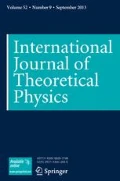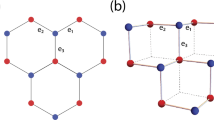Abstract
The idea of nondissipative, persistent currents in mesoscopic metallic or semiconducting rings and cyclinders appears counterintuitive, because it contradicts our experience with currents in macroscopic metals. On the other hand such orbital currents are well known properties of atoms. A comparative study of nondissipative ring currents in different finite quantum systems is therefore of interest. In this paper the properties of atoms, mesoscopic metallic or semiconducting rings and cylinders and elongated molecules called carbon nanotubes are discussed and compared.
Similar content being viewed by others
References
Ajiki, H. and Ando, T. (1993). Journal of the Physics Society of Japan 62, 2470.
Avishai, Y. and Braverman, G. (1995). Physical Review 52, 12135.
Bachtold, A., Strunk, C., Salvetat, J. P., Bohard, J. M., Forro, L., Nussbaumer, T., and Schönenberger, C. (1999). Nature 397, 673.
Chandrasekhar, V., Webb, R. A., Brady, M. J., Ketchen, M. B., Galagher, W. J., and Kleinsasser, A. (1991). Physical Review Letters 67, 3578.
Cheung, H., Gefen, Y., and Riedel, E. K. (1988). Physical Review B 37, 6050.
Dresselhaus, M. S., Dresselhaus, G., and Avouris, Ph. (Eds.) (2001). Carbon Nanotubes: Synthesis, Structure, Properties and Applications, Springer, Berlin.
Ginter, J. (1979). Introduction to Physics of Atoms, Molecules and the Solid State, PWN, Warsaw.
Goldhaber-Gordon, D. and Goldhaber-Gordon, I. (2001). Nature 412, 594.
Hund, F. (1938). Annals of Physics 32, 102.
Iijima, S. (1991). Nature 354, 56.
Kociak, M., Kasumov, A. Yu., Gueron, S., Reulet, B., Khodos, I. I., Gorbatov, Yu. B., Volkov, V. T., Vaccarini, L., and Bouchiat, H. (2001). Physical Review Letters 86(11), 2416.
Kresin, V. Z. (1967). Physics Letters A 24(13), 749.
Levy, L. P., Dolan, G., Dansmuir, J., and Bouchiat, H. (1990). Physical Review Letters 64, 2074.
Lisowski, M. (2000). PhD Thesis, unpublished.
Lisowski, M., Zipper, E., and Stebelski, M. (1988). Physical Review B 37, 6050.
Mailly, D., Chapelier, C., and Benoit, A. (1993). Physical Review Letters 70, 2020.
Stebelski, M., Lisowski, M., and Zipper, E. (1998). European Physics Journal B 1, 215.
Szopa, M., Margańska, M., and Zipper, E. (2002). Physics Letters A 299, 593-600.
Tang, Z. K., Zhang, L., Wang, N., Zhang, X. X., Wen, G. H., Li, G. D., Wang, N., Chan, C. T., and Sheng, P. (2001). Science 292, 2462.
Tsebro, V. J., Omelyanovskii, O. E., and Moravskii, A. P. (1999). JETP Letters 70, 462.
Wohlleben, D., Esser, M., Freche, P., Zipper, E., and Szopa, M. (1991). Physical Review Letters 66, 3191.
Zhao, G. and Wang, Y. S. (2001). cond-mat/0111268.
Author information
Authors and Affiliations
Rights and permissions
About this article
Cite this article
Czechowska, M., Szopa, M. & Zipper, E. Nondissipative Orbital Currents in Finite Quantum Systems: A Comparative Study. International Journal of Theoretical Physics 42, 1107–1118 (2003). https://doi.org/10.1023/A:1025447312296
Issue Date:
DOI: https://doi.org/10.1023/A:1025447312296




